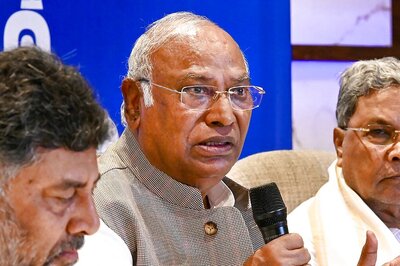
views
The upcoming Union Budget on July 23 will shed light on initiatives that may reshape economic priorities under the Modi 3.0 government. Amid various expectations and commitments, the government’s focus on skills, employment, and innovation emerges as a key strategy for addressing current challenges and shaping future opportunities.
The decision to rename the Cabinet Committee on Employment and Skill Development to include livelihood emphasises a shift to provide employable skills to the most vulnerable—67 per cent of the country’s underprivileged population.
Placing skill development ahead of employment underscores a proactive approach to addressing the issue of a shortage of skilled workers, especially in the health and wellness, manufacturing, and technology sectors. This not only recognises the immediate need for a trained workforce but also positions skill development as a key driver for sustainable employment generation.
As the budget approaches, stakeholders across sectors eagerly await concrete measures that go beyond mere promises and lead to tangible outcomes. The effectiveness of these initiatives in translating into job creation, technological innovation, and sustainable economic growth will be carefully scrutinised. The government’s steadfast commitment to enhancing skills holds the promise of unleashing India’s potential as a global economic powerhouse in the years ahead.
The rebranding and revitalisation of the 15-year-old National Skill Development Mission (NSDM) as the Skill India Mission under PM Narendra Modi has sparked concerns about the effectiveness of the ambitious Skill India program. This programme has received support from two governments over the past 15 years—first the UPA and then the NDA.
Issues such as the delayed implementation of Pradhan Mantri Kaushal Vikas Yojana 3.0 and a lack of placement support are exacerbating the employment problem. The latest data underlines the severity of India’s unemployment crisis, making it crucial to prioritise employment generation to confront the challenges facing the Indian economy, especially with a significant number of young people entering the working age each month.
In July 2015, PM Modi stated that “Skill India aims to build self-confidence among the underprivileged rather than just providing jobs”. However, nearly a decade later, the youth’s interest in the programme seems to be waning. The Ministry of Skill Development and Entrepreneurship has implemented strict attendance monitoring and centralised student information. Unfortunately, this has led to a decline in student retention, with many dropping out due to the rigid attendance requirements.
Skill India was designed to attract unskilled young people and equip them for the job market, but unemployment rates are concerning. Data from the International Labour Organisation reveals that the proportion of educated unemployed individuals has risen from 35.2 per cent in 2000 to 65.7 per cent in 2023.
Established in 2014, the Ministry of Skill Development and Entrepreneurship absorbed the NSDC and other programmes to train 300 million people by 2024. Despite partnering with various organisations and raising awareness, the programmes have not been as effective as envisioned.
Experts argue that even traditional degrees do not guarantee employment, and the education system is outdated and not job-focused. Only a small percentage of candidates certified by the PMKVY programme have found jobs, indicating a fundamental challenge with the current skilling initiatives.
Boosting skilling programmes and industry partnerships is an urgent necessity to create ongoing skilling avenues and improve employability for school dropouts and unskilled or semi-skilled workers who need to secure a livelihood. Although the announcement of setting up 75 skilling e-labs for simulated learning in the 2022–23 Union Budget is a positive move, we must recognise that our problem is far-reaching. The API-based trusted skill credentials and discovery layers to find relevant jobs and entrepreneurial opportunities won’t suffice beyond a certain point, necessitating an urgent need to skill the masses and empower the country’s youths.
We must acknowledge that over 40 per cent of Indians aged 15 to 24 are neither in education, employment, nor training, which is significantly higher than the South Asian (30 per cent) and global (24 per cent) averages. Indian firms report substantial skill shortages compared to other countries, and they assess only about 46 per cent of graduates as employable. The majority of students lack the necessary skills, and the skills they do possess are not aligned with the needs of their employers.
Every year, more than 12 million young people in India become employable, yet we are unable to absorb them into the workforce. Many of these individuals hold higher education degrees, but they lack the necessary employable skills. The India Skills Report (ISR) 2024 highlights that only 50.3 per cent of graduates from higher educational institutions are deemed employable.
A skill gap study conducted by the National Skill Development Corporation during 2010–14 indicates that by 2025, India will need nearly 109.7 million additional skilled workers across various sectors. While the government’s interventions in promoting skill development are commendable, more needs to be done to bridge the skill gaps.
Wish list: In the 2024–25 Union Budget, it is crucial to prioritise upskilling initiatives for gig workers. Due to the eight-fold increase in young people’s participation in the gig economy from 2019 to 2023, the majority of these youth come from Tier-I and Tier-II cities and rural areas.
While the government is working to make employable skills more accessible through public-private partnerships, there is a need to facilitate and incentivize the establishment of more skill development universities to steer the youth, especially undergraduates, towards skills. This will help align the skill courses with global standards and significantly enhance the youth’s skills, contributing to the nation’s workforce development.
I strongly urge a significant budget allocation to provide employable skills, particularly to school dropouts, on a priority basis. This will not only empower them but also significantly contribute to the growth of the Indian economy, aiming to reach $7 trillion by 2030 and position India as the world’s third-largest economy.
The writer is co-founder and MD, Orane International, a Training Partner with National Skill Development Corporation (NSDC), and a Network Member of India International Skill Centres, an initiative of GoI. Views expressed in the above piece are personal and solely those of the author. They do not necessarily reflect Firstpost’s views.




















Comments
0 comment